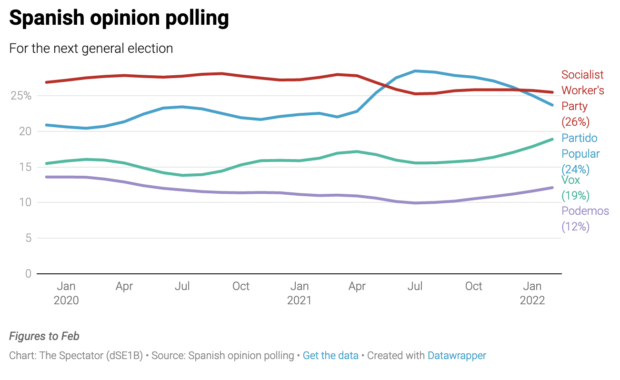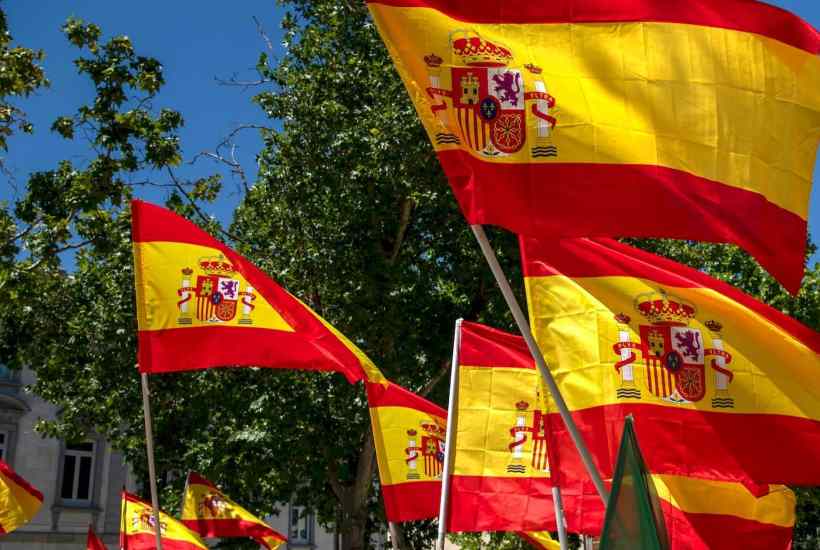Yesterday’s snap election in Castile-León, one of the 17 regional autonomies into which Spain is divided, was another excellent day for Vox, the most right-wing of Spain’s mainstream parties. Vox, which previously had just one seat in the 81-seat regional assembly, now has 13 and holds the balance of power.
Vox’s success prevented the Partido Popular, which has governed in Castile-León for over three decades, achieving an absolute majority (41 seats or more). Instead after winning only 31 seats, the Partido Popular, Spain’s main party of the right, said it would begin discussions with all the parties. But the arithmetic suggests that in order to form a stable government the Partido Popular will depend on Vox — something it dearly wants to avoid.
The success of Vox has come as no surprise to those in Spain. In the most recent general election in November 2019, Vox surged to 15 per cent of the vote, winning 52 of the 350 seats in the national parliament and becoming the country’s third-largest political party. Meanwhile, the Partido Popular got only 21 per cent of the vote and 88 seats — a far cry from the 45 per cent and 186 seats it won in its heyday of 2011 before Vox appeared.

Vox was founded in 2013 by fugitives from the Partido Popular who were disgusted at their party’s meek compliance with the instruction from the European Court of Human Rights to release Basque terrorists on the grounds that they had already been in prison too long. Soon the Partido Popular, mired in never-ending corruption scandals, was losing credibility while Vox was establishing itself as the only party ready to take the robust stance against the Catalan nationalists that so many Spaniards demand.
Vox’s apparent integrity and easily understood policies appeal to many Spaniards. The party also takes an uncompromising (many say xenophobic) position on immigration, is strong on law and order, upholds traditional Catholic values — it also shows a refreshing contempt for political correctness and is unapologetically proud of Spain’s history and way of life. Given its views on sovereignty and immigration, it’s not surprising that Vox is the most eurosceptic party in this overwhelmingly europhile country.
Vox positions itself boldly and astutely on a number of key issues that Spaniards care about. Steadfast in its support for ‘la España que madruga’ (literally ‘the Spain that gets up early’, by which it means hardworking Spaniards who struggle to make ends meet), its leader, Santiago Abascal, has vowed to protect people whose livelihoods are being threatened by ‘environmentally friendly’ policies. And the party’s promise to make Spain self-sufficient in energy sits well with its popular ‘buy Spanish’ policy.
Virulently anti-socialist, Vox has denounced Spain’s present government as the worst for over 80 years. Since those 80 years include Franco’s dictatorship, some on the left have responded by suggesting that Vox is a threat to democracy. But Vox claims to have enriched Spanish democracy; its apparent sincerity seems to have mobilised some who previously didn’t bother to vote. These new voters see Vox as a refreshingly corruption-free, radically conservative party, that puts Spain and Spaniards first; finally, they have found a party that says what it means and means what it says.
Vox’s success in yesterday’s and other recent elections is unlikely to be ephemeral. While nearly 40 per cent of the support for the Partido Popular comes from people aged 64 and over, only about 12 per cent of Vox voters are that old. Overwhelmingly first-time voters looking for a right-wing party seem to prefer Vox. As the Partido Popular voter base slowly dwindles, support for Vox, the radical new voice of the Spanish right, looks set to grow.
Meanwhile the two parties have to co-exist. Unless it somehow contrives to survive as a minority government making ad hoc arrangements with different political groupings, the Partido Popular will reluctantly have to accept Vox’s offer of a coalition government in Castile-León. If so, with the left-wing parties of Spain’s ruling coalition losing ground yesterday, Castile-León’s new regional government will give Spain a foretaste of the right-wing alliance that could be in power in Spain after the next general election, due before the end of 2023.
Got something to add? Join the discussion and comment below.
Get 10 issues for just $10
Subscribe to The Spectator Australia today for the next 10 magazine issues, plus full online access, for just $10.



















Comments
Don't miss out
Join the conversation with other Spectator Australia readers. Subscribe to leave a comment.
SUBSCRIBEAlready a subscriber? Log in